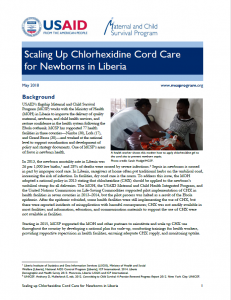
USAID’s flagship Maternal and Child Survival Program (MCSP) works with the Ministry of Health (MOH) in Liberia to improve the delivery of quality maternal, newborn, and child health services, and restore confidence in the health system following the Ebola outbreak. MCSP has supported 77 health facilities in three counties—Nimba (30), Lofa (17), and Grand Bassa (30)—and worked at the national level to support coordination and development of policy and strategy documents. One of MCSP’s areas of focus is newborn health.
In 2013, the newborn mortality rate in Liberia was 26 per 1,000 live births,1 and 28% of deaths were caused by severe infections.2 Sepsis in newborns is caused in part by improper cord care. In Liberia, caregivers at home often put traditional herbs on the umbilical cord, increasing the risk of infection. In facilities, dry cord care is the norm. To address this issue, the MOH adopted a national policy in 2013 stating that chlorhexidine (CHX) should be applied to the newborn’s umbilical stump for all deliveries. The MOH, the USAID Maternal and Child Health Integrated Program, and the United Nations Commission on Life-Saving Commodities supported pilot implementation of CHX in health facilities in seven counties in 2013–2014, but the pilot process was halted as a result of the Ebola epidemic. After the epidemic subsided, some health facilities were still implementing the use of CHX, but there were reported incidents of misapplication with harmful consequences; CHX was not readily available in most facilities; and information, education, and communication materials to support the use of CHX were not available in facilities.
Starting in 2015, MCSP supported the MOH and other partners to reinstitute and scale up CHX use throughout the country by developing a national plan for scale-up, conducting trainings for health workers, providing supportive supervision in health facilities, ensuring adequate CHX supply, and monitoring uptake.